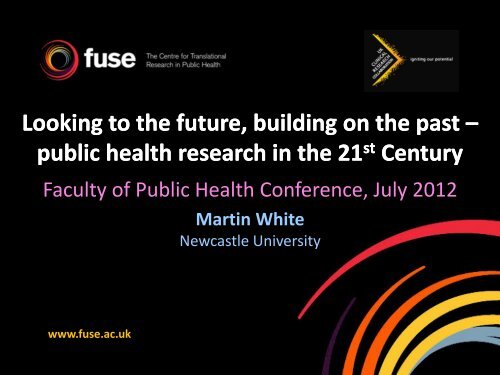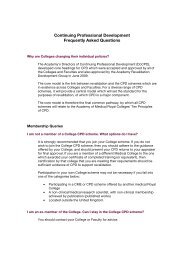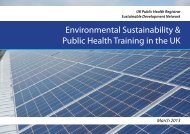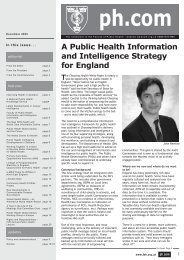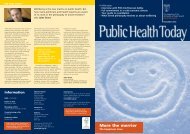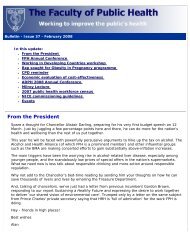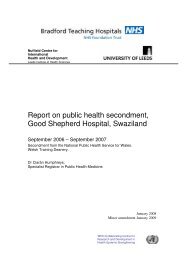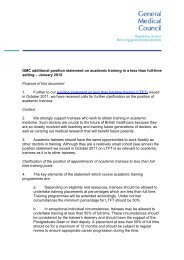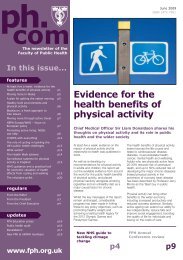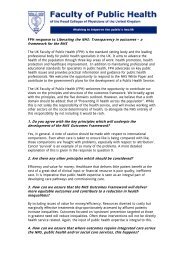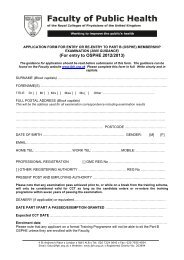Professor Martin White - UK Faculty of Public Health
Professor Martin White - UK Faculty of Public Health
Professor Martin White - UK Faculty of Public Health
You also want an ePaper? Increase the reach of your titles
YUMPU automatically turns print PDFs into web optimized ePapers that Google loves.
Looking to the future, building on the past –<br />
public health research in the 21 st Century<br />
<strong>Faculty</strong> <strong>of</strong> <strong>Public</strong> <strong>Health</strong> Conference, July 2012<br />
<strong>Martin</strong> <strong>White</strong><br />
Newcastle University<br />
www.fuse.ac.uk
<strong>Public</strong> health research in the 21 st century<br />
> What has happened to public health research over<br />
the last 15 years<br />
> How has public health research responded to<br />
emerging challenges and opportunities<br />
> What are the major, future challenges for public<br />
health research<br />
> How well is academia and its relationship with the<br />
public health system placed to respond to these<br />
challenges<br />
> What next
What has happened to public health research<br />
over the last 15 years<br />
> Influential shifts in thinking:<br />
• Models for intervention research (e.g. MRC framework)<br />
• EBM movement, NICE public health guidance etc.<br />
• Emergence <strong>of</strong> translational research<br />
> Transformation <strong>of</strong> research funding<br />
> Unprecedented expansion <strong>of</strong> capacity<br />
> Loss <strong>of</strong> academic public health specialists<br />
> Disconnection between public heath academia and<br />
practice
Research on smoking in South Asian men<br />
Problem<br />
Definition<br />
Solution<br />
Generation<br />
Innovation<br />
Testing<br />
Intervention<br />
Demonstration<br />
Intervention<br />
Implementation<br />
Epidemiological<br />
study <strong>of</strong><br />
cardiovascular risk<br />
among South Asian<br />
ethnic minority<br />
groups in Newcastle<br />
Qualitative studies<br />
<strong>of</strong> South Asian men<br />
to gain deeper<br />
understanding <strong>of</strong><br />
smoking in their<br />
culture<br />
Small scale<br />
evaluative trial,<br />
testing efficacy and<br />
acceptability <strong>of</strong><br />
community based<br />
intervention<br />
RCT <strong>of</strong> community<br />
outreach<br />
intervention to<br />
promote smoking<br />
cessation among<br />
South Asian men<br />
Systematic review<br />
on the cultural<br />
adaptation <strong>of</strong><br />
interventions for<br />
ethnic minorities<br />
Review <strong>of</strong> evidence<br />
<strong>of</strong> effectiveness for<br />
smoking cessation<br />
interventions<br />
Qualitative study to<br />
assess acceptability<br />
and feasibility <strong>of</strong><br />
evidence-based<br />
interventions<br />
Bhopal et al. Heterogeneity in coronary heart disease and risk factors<br />
in Indian, Pakistani, Bangladeshi and European origin populations.<br />
BMJ, 1999; 319: 215-220.<br />
Bush et al. Understanding influences on smoking in Bangladeshi and<br />
Pakistani adults: a community based qualitative study. BMJ, 2003;<br />
326: 962-6.<br />
<strong>White</strong> et al. Quitting smoking and experience <strong>of</strong> smoking cessation<br />
interventions among Bangladeshi and Pakistani adults: public and<br />
pr<strong>of</strong>essional views. J Epidemiol Community <strong>Health</strong> 2006;60:405-411.<br />
Begh et al. Promoting smoking cessation in Pakistanis and<br />
Bangladeshis in the <strong>UK</strong>: cluster randomised controlled trial <strong>of</strong> trained<br />
community outreach workers. Trials, 2011;12:197<br />
Liu et al. Adapting health promotion interventions to meet the needs<br />
<strong>of</strong> ethnic minority groups: mixed methods evidence synthesis. <strong>Health</strong><br />
Technology Assessment (in press)
Research funding<br />
> 2004 – National Prevention Research Initiative (NPRI) launched -<br />
£33m invested in 74 projects by a panel <strong>of</strong> 16 funders, led by MRC<br />
> 2005 – <strong>Public</strong> <strong>Health</strong> Research Consortium (PHRC) launched by<br />
Department <strong>of</strong> <strong>Health</strong> - £7.7m invested over 10 years in research<br />
on national policy priorities, including major evaluations<br />
> 2005 MRC Population <strong>Health</strong> Sciences Research Network<br />
established - £2.5m over 5 years<br />
> 2008 – 5 <strong>Public</strong> <strong>Health</strong> Research Centres <strong>of</strong> Excellence funded by<br />
a panel <strong>of</strong> 8 funders, under auspices <strong>of</strong> <strong>UK</strong>CRC – £41m over 10<br />
years (+SCPHRP - £9m, 10 years)<br />
> 2009 – NIHR <strong>Public</strong> <strong>Health</strong> Research programme<br />
launched - £10m/year, >£30m to date<br />
>£131m<br />
> 2012 – NIHR School for <strong>Public</strong> <strong>Health</strong> Research<br />
investment<br />
launched - £20m over 5 years initially<br />
in 12 years
Expansion <strong>of</strong> capacity<br />
> NIHR Fellowships programme – doctoral, post-doc,<br />
career development, career scientist<br />
> Growth <strong>of</strong> public health masters’ programmes<br />
> Capacity building initiatives – <strong>UK</strong>CRC PHRCoEs: >50<br />
new staff, >50 PhD studentships<br />
> Research project and programme funding =<br />
significant expansion <strong>of</strong> research staff numbers<br />
> RAE/REF and investment in higher education –<br />
expansion <strong>of</strong> research intensive universities
How has research responded to challenges<br />
and opportunities <strong>of</strong> last 15 years<br />
> Major shifts in research focus:<br />
• Emergence and development <strong>of</strong> behavioural<br />
sciences<br />
• Expansion <strong>of</strong> Intervention development research<br />
• Systematic reviews underpinning intervention<br />
research<br />
• Natural experimental evaluations<br />
• Translational research<br />
• More rigorous methodological research
2008/09 Q1<br />
2008/09 Q2<br />
2008/09 Q3<br />
2008/09 Q4<br />
2009/10 Q1<br />
2009/10 Q2<br />
2009/10 Q3<br />
2009/10 Q4<br />
2010/11 Q1<br />
2010/11 Q2<br />
2010/11 Q3<br />
Smoking prevalence: SHAs in England<br />
25%<br />
20%<br />
15%<br />
10%<br />
5%<br />
North East SHA North West SHA Yorkshire and The Humber SHA<br />
East Midlands SHA West Midlands SHA East <strong>of</strong> England SHA<br />
London SHA South East Coast SHA South Central SHA<br />
South West SHA<br />
England<br />
0%
Domains to inform our understanding <strong>of</strong> what affects<br />
midwives’ pr<strong>of</strong>essional behaviours<br />
Knowledge<br />
Interaction<br />
between<br />
midwife and<br />
pregnant<br />
woman<br />
Factors<br />
influencing<br />
the behaviour<br />
<strong>of</strong> the<br />
pregnant<br />
woman
Evaluation <strong>of</strong> a modified care pathway to promote<br />
increased smoking cessation rates among pregnant<br />
women: a proposed randomised stepped wedge trial<br />
Allocation<br />
blocks<br />
2012 2013*<br />
Sept Oct Nov Dec Jan Feb Mar Apr May Jun Jul Aug<br />
Area 1 (2<br />
Trusts)<br />
Area 2 (3<br />
trusts)<br />
Area 3 (1<br />
trust)<br />
Area 4 (2<br />
trusts)<br />
Control steps: full data collection, no intervention<br />
Initial intervention delivery: training and implementation, leading to full fidelity<br />
Full intervention delivery at full fidelity
What are the major, future challenges for<br />
public health research<br />
> Economy – global development , climate change,<br />
epidemiological transition, demographic shifts, boom<br />
and bust<br />
> Globalisation – public health threats from<br />
communicable diseases, climate change, environmental<br />
disasters and degradation<br />
> Inequality – widening due to economy and IGIs<br />
> Corporate power – Big Tobacco, Big Alcohol, Big Food,<br />
Big <strong>Health</strong> Care, Big everything...<br />
> Evidence-free policy and practice –initiatives with no<br />
prior evidence and no evaluation
How well is public health research placed to<br />
respond to these challenges<br />
> Infrastructure is strong and growing , but...<br />
• Needs to be less inward looking, more outward<br />
facing<br />
• Needs to build relationships to address new kinds<br />
<strong>of</strong> public health challenges<br />
• Needs to intensify focus on translation<br />
• Need to be more adventurous with policy<br />
evaluation<br />
• Needs to really grasp nettle <strong>of</strong> tackling health<br />
inequalities
The Change4Life convenience store evaluation
Intervention-generated inequalities<br />
“Unintended and unwanted variations in<br />
outcomes for individuals or population<br />
sub-groups that result from any element <strong>of</strong><br />
any [health] intervention”<br />
<strong>White</strong> M, Adams J, Heywood P. How and why do interventions that increase health<br />
overall widen inequalities within populations In Babones S (Ed.). <strong>Health</strong>, inequality<br />
and society. Bristol: Policy Press, 2009.
The points in intervention pathways at which<br />
socio-economic gradients can arise<br />
Provision<br />
Macro-needs<br />
assessment<br />
Provision <strong>of</strong><br />
services<br />
Micro-needs<br />
assessment<br />
Provision <strong>of</strong><br />
Interventions<br />
L H L H<br />
L H<br />
L H<br />
<strong>Health</strong> Outcome<br />
Long term<br />
compliance<br />
Efficacy <strong>of</strong><br />
intervention<br />
Uptake <strong>of</strong><br />
intervention<br />
L H L H L H L H<br />
Response
Meta-analysis: odds <strong>of</strong> receiving surgery for lung<br />
cancer - low versus high SEP
The relationship between water fluoridation and socioeconomic<br />
deprivation on tooth decay in 5-year-old children<br />
Jones CM, Worthington H. BDJ 1999; 186(8): 397-400
What next<br />
> Academia needs to embrace the outside world,<br />
including public health policy and practice<br />
• More research in and for the real world<br />
• Co-production <strong>of</strong> research with policy and practice<br />
• Shared events<br />
> <strong>UK</strong> PHR needs to decide how much to invest in<br />
global health research<br />
> <strong>Public</strong> health practice needs to ‘walk the talk’ with<br />
evidence based public health<br />
> Implications for public health training – in research<br />
and evidence awareness and skills<br />
> FPH has a role to play...
Links: flagship public health research initiatives<br />
> PHRSN http://www.populationhealthsciences.org/<br />
> <strong>UK</strong>CRC PHRCoEs http://www.esrc.ac.uk/about-esrc/what-wedo/our-research/ukcrc.aspx<br />
> NIHR PHR http://www.phr.ac.uk/<br />
> PHRC http://phrc.lshtm.ac.uk/<br />
> NIHR SPHR http://www.sheffield.ac.uk/scharr/sphr<br />
> NICE <strong>Public</strong> <strong>Health</strong> http://www.nice.org.uk/guidance/phg/
Thanks and more…<br />
> Thanks to the many people who I have worked with over many years who have<br />
shaped my thinking and collaborated on research, including members <strong>of</strong>: the <strong>Public</strong><br />
<strong>Health</strong> Research Consortium, <strong>UK</strong>CRC <strong>Public</strong> <strong>Health</strong> Research Centres <strong>of</strong> Excellence,<br />
NIHR School for <strong>Public</strong> <strong>Health</strong> Research, NIHR <strong>Public</strong> <strong>Health</strong> Research Board, NICE<br />
Centre for <strong>Public</strong> <strong>Health</strong> Excellence, MRC Population <strong>Health</strong> Sciences Research<br />
Network, and my colleagues in the Institute <strong>of</strong> <strong>Health</strong> & Society, Newcastle<br />
University.<br />
> Contact details<br />
www.fuse.ac.uk<br />
martin.white@ncl.ac.uk<br />
Skype & twitter: martinwhite33<br />
Tel: +44 (0)191 222 6275<br />
The author is funded in part by Fuse, the Centre for Translational Research in <strong>Public</strong> <strong>Health</strong>, a <strong>UK</strong>CRC <strong>Public</strong><br />
<strong>Health</strong> Research: Centre <strong>of</strong> Excellence. Funding from the British Heart Foundation, Cancer Research <strong>UK</strong>,<br />
Economic and Social Research council, Medical Research Council, and the National Institute for <strong>Health</strong> Research,<br />
under the auspices <strong>of</strong> the <strong>UK</strong> Clinical Research Collaboration, is greatly acknowledged. Opinions expressed in this<br />
presentation do not necessarily represent those <strong>of</strong> the funders.


